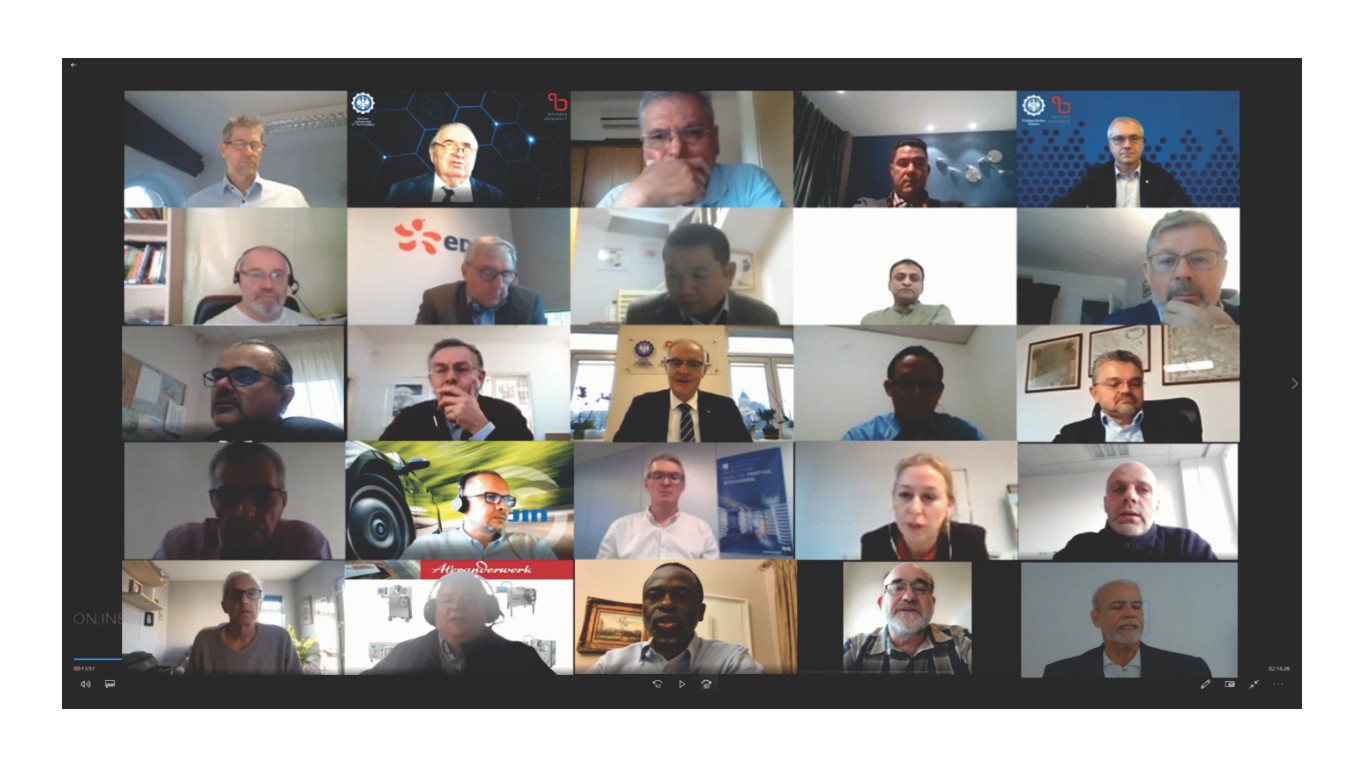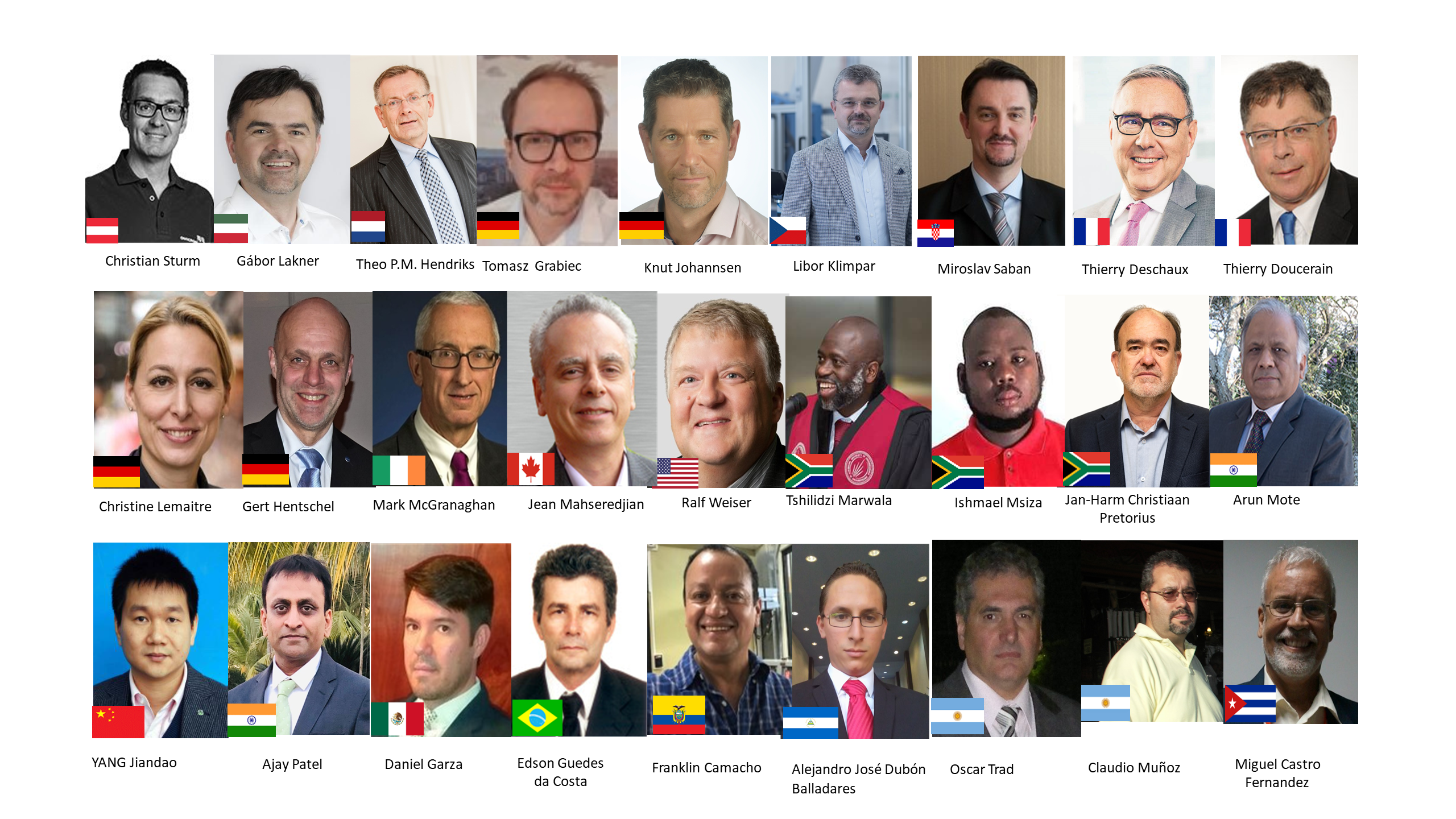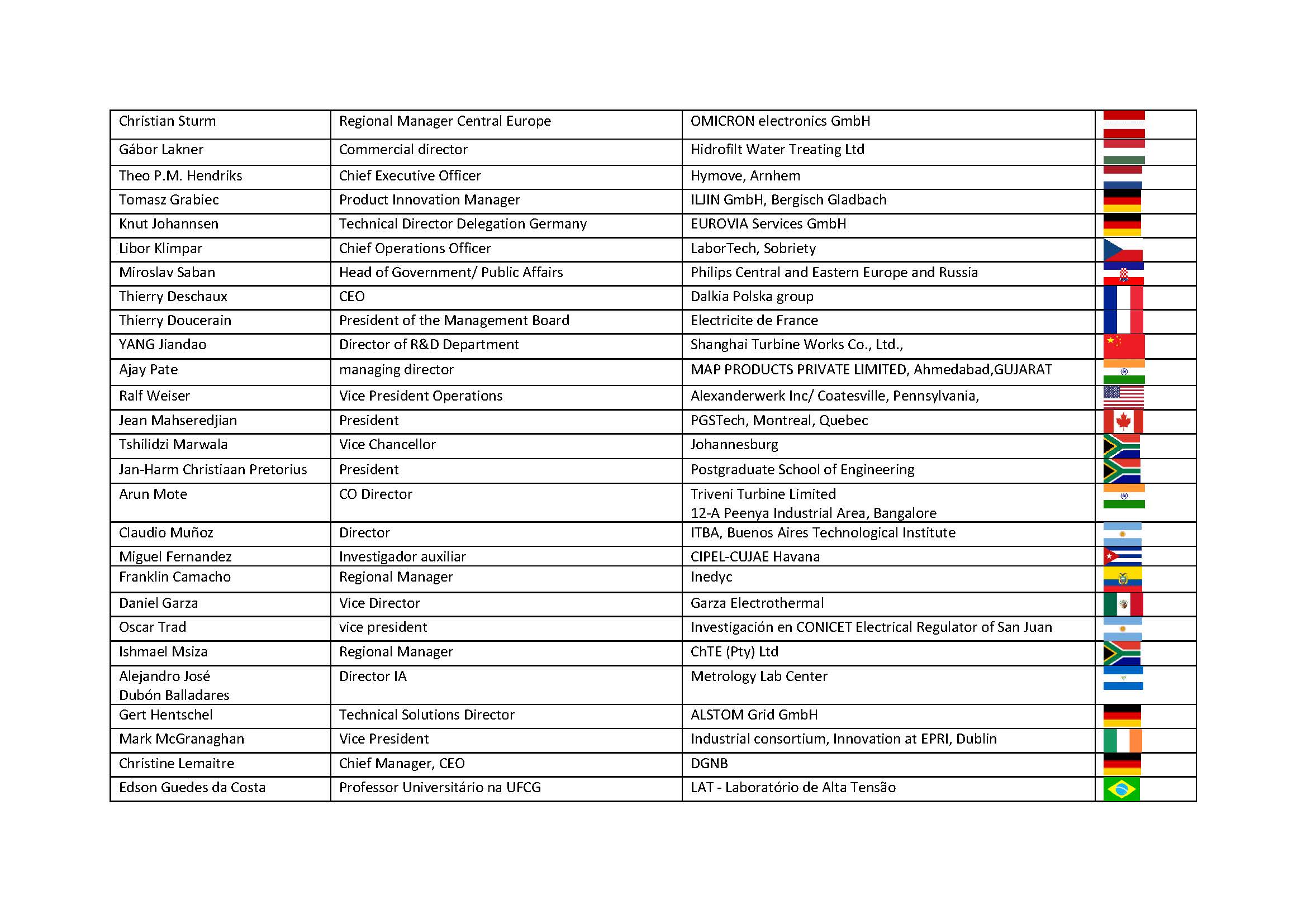Start - Pierwsze posiedzenie Międzynarodowego Zespołu Konsultacyjnego
Pierwsze posiedzenie Międzynarodowego Zespołu Konsultacyjnego na Politechnice Śląskiej
On November 22, 2021 the International Consultative Board held its first session.
The session was held online with the use of the ZOOM platform.

The meeting was opened by Prof. Paweł Sowa, PhD, DSc, the Rector’s Plenipotentiary for the International Consultative Board.
On the first meeting, representing the Silesian University of Technology, along with prof. Sowa, present were: His Magnificence Rector of the Silesian University of Technology Professor Arkadiusz Mężyk, PhD, DSc and the Vice Rector for Science and Development Professor Marek Pawełczyk, PhD, DSc.
The board features members that are experts of a wide range of fields, representing various units with common interest (industry, commercial units, universities).
Apart from the three mentioned Polish representatives of the Silesian University of Technology, the International Consultative Board features 28 members from 5 continents: 3 from North America, 6 from South and Central America, 13 from Europe, 3 from Africa and 3 from Asia.
His Magnificence Rector of the Silesian University of Technology Professor Arkadiusz Mężyk, PhD, DSc introduced the background of the Silesian University of Technology. Introduced its history, relevant information on its location, its structure (basic units and their placement), information of the faculties, the study courses, along with a range of possibilities of studies in English. He also told about recent developments and commitments (like the European Universities Initiative and EURECA-PRO), along with the recent significant achievements. The priority research areas of the Silesian University of Technology have also been mentioned along with the idea of implementation doctorates, bringing science and industry closer together. The Silesian University of Technology is one of the biggest and best technical universities in Poland. As the only one in Silesia it holds the status of Research University (these statuses have been awarded in 2019; only 10 universities in the country have this status).
Vice Rector for Science and Development Professor Marek Pawełczyk, PhD, DSc mentioned about the importance of the Board and its role to support the university in its strategy, in particular in the pursue of excellence in scientific research, modern education, internalization and increased recognition. The board achieves its goal in particular by carrying out actions that support the university in establishing relations and cooperation with native and foreign universities, scientific and economic organizations and enterprises. He mentioned that the role is also to support the university in establishing contacts with outstanding scientists from abroad and that it is important that the board draws attention to current topics in which the university can play a leading role – here the Vice Rector mentioned, in particular, the (mentioned earlier) priority research areas of the Silesian University of Technology.
After the introduction made by members of the Silesian University of Technology, as this was the first Board’s session, prof. Sowa asked the members of the board to introduce their background and that of their represented unit.
First was Professor Jean Mahseredjian, CEO of the company PGSTech, who is also Professor at Polytecnique Montreal (University of Montreal). PGSTech are responsible for the development and commercialization of the well-known EMTP software (where prof. Mahseredjian is the creator and lead developer). They also have a lot of consulting activities concerning power system analyses including very large scale systems with renewables (renewable energy sources).
Christian Sturm, graduate of University of Applied Sciences, FH Voralberg and University of Limerick, now Regional Manager CEU of the Austrian Company OMICRON. The company is characterized by its multinationality as they currently employing people from 45 different countries in 25 offices worldwide, serving customers in more than 160 countries. Their R&D (research and development) rate is above 15%. They specialize in the areas of protection and power utility communication testing solutions. He also mentioned of their business unit called Primary Testing and Diagnosis, focusing on power transformers, instrument transformers, circuit breakers and motors and generators. Relatively not long ago they also got involved in the area of cyber security, where their Intrusion Detection and Grid Monitoring system has been mentioned.
Gabor Lakner from Hungary, environmental engineer, mainly involved in the water treatment industry, commercial director of Hidrofilt Ltd. The company is a designer, manufacturer and operator of water treatment systems for industries, municipalities and agriculture. They comprise of 170 employees. They are also involved in a wide range of industries e.g. in the pharmaceutical and microelectronics industries (in particular in High Purity Water Treatment due to these industries demanding special water quality) and in food and beverage production and containerized water treatment systems.
From Netherlands, Theo P.M. Hendriks, PhD in High-Speed Aerodynamics, Co-Founder of HyMove B.V. (supplier of Hydrogen Fuel Cell systems in the Netherlands) and Co-Founder of Buses4Future GmbH (supplier of Fuel Cell buses in Germany) who has special interest in transition modeling towards renewable energy supply, global production and logistics of green hydrogen and local and regional eco-systems of hydrogen supply and applications.
From the German subsidiary of the Iljin company (South Korea) Tomasz Grabiec, PhD Eng, mainly involved in Wheel Baring R&D, Brake Technology and Product Innovation Manager. The company itself has 22 global production plants, around 6000 employees; their main area of products is related to chassis components, bearings and robotic components like strain wave gears, cross roller bearings and smart actuators. They have lots of worldwide automotive customers such as BMW, Volksvagen, Audi, Jaguar, Renault, Nissan, Hyundai, Ford and many others.
Knut Johannsen from Germany, from the Eurovia company, which has around 500 business units and 15 countries (54% of those in France, 27% in the rest of Europe, 19% in North and South America). He represents Eurovia Germany and the Technical Director responsible for research and development; they have around 1700 sites and projects around Germany with 3706 employees and 275 trainees. They are in touch with a lot of universities around Europe and together are involved in R&D projects.
Libor Klimpar from Czechia, representing LaborTech, a developer and manufacturer of testing machines, equipment and automatization. One of their goals is to continue to provide customers with modern technical and technological solutions in the field of material testing. He told about the comprehensive portfolio of the company, penetrating all fields of research and development, contributing significantly to the quality assurance in more than 20 industries (e.g. engineering, nuclear energetics, automotive, building and aerospace industry).
From an office in France Thierry Deschaux, general director of EDF, a world leading electricity company, covering all electricity-related activities i.a. electricity generation (in 2020: 501.9TWh worldwide, 90% of which was carbon-free electricity), transmission and distribution, energy supply and optimization and trading. The company employs around 165 thousand people with 38.9 million customer sites worldwide. They have a long partnership in Poland (e.g. involved in the Polish Nuclear Power Programme and renewable energies).
Next, Thierry Doucerain from France briefly introduced his background, where for many years he was also involved with EDF (EDF Polska in particular), where for many years he took on management (e.g. he has been Chief Executive Officer in 2014-2017); from January 2018 to March 2019 he was Advisor to the Vice President for International Affairs in EDF Group: in charge of coaching of Project Managers and Business Developers. Currently he is working as an expert in energetic topics, mainly in Poland, for the French Ambassy, French-Polish Chamber of Commerce in Warsaw and for investors in Poland.
Christine Lemaitre, representing DGNB, the German Sustainable Building Council. It is Europe’s biggest network for sustainable building, it is an association that represents Germany in the World Green Building Council. Their aim is to introduce the topic of sustainability in the building environment. They have more than 8000 certificates in around 30 countries worldwide. She explained that the topic of knowledge sharing is a significant part of their work; they collaborate with around 70 universities and colleges of higher education.
Prof. Gert Hentschel, PhD, from Technical University Dresden, Germany; he is also Technical Solutions Manager of Grid Solutions renewable energy consisting of different sectors, production of onshore and offshore wind turbines, battery and energy storage devices. The company has over 13 thousand employees worldwide. They provide solutions for the full scope transformation of the energy system, power electronics devices and high voltage equipment.
Mark McGranagham from Ireland (representing the Electric Power Research Institute in the USA) who has a long history of working with some of the distribution companies like PSE, Energa, Tauron in Poland. EPRI itself is an non-profit international collaborative research organization that organizes and does research for the electric power industry around the world. Their values are in objective, scientifically based results, chartered to serve public benefit. They have a substantial European project portfolio including recent projects concerning i.a. cyber security assessment and metrics, EMF modeling, energy storage valuation and demonstration, assessment of distributed energy resource hosting capacity with DSOs.
Next: Ralf Weiser, Vice President of Operations at Alexanderwerk Inc located in the United States (subsidiary of the German Alexanderwerk company). The Alexanderwerk Group is a supplier of high-quality machines to the Pharmaceutical Industry, Chemical Industry, Life Science and Food Industry and the Nuclear Industry. They are a market leader for compaction and dry granulation machines. They have international research partnerships with well-known international universities i.a. in the USA, the UK, Germany and China.
Joining the board was also Professor Tshilidzi Marwala, the Vice-Chancellor and Principal of the University of Johannesburg (South Africa), who cooperates with the Silesian University of Technology’s Faculty of Electrical Engineering ever since he began his cooperation with prof. Sowa several years ago. He spoke of the vision of the University of Johannesburg being an international university of choice anchored in Africa, dynamically shaping the future. He mentioned that the mission of his university is to inspire its community to transform and serve humanity through innovation and collaborative pursuit of knowledge. The University of Johannesburg is a diverse, inclusive, transformational and collegial institution with a student population of over 50 thousand, of which over 3 thousand are international students from more than 80 countries. The Professor also mentioned his rich research background (including 19 books on AI) and his functions over the years, including currently: as a board member of Nedbank, a trustee of the Nelson Mandela Foundation and the Deputy Chair of the Presidential Commission on the 4IR.
Also from South Africa joining the board was Ishmael Msiza, Software Engineering Lead in ChTE, a small technology development enterprise based in Johannesburg. He has experience in working for CSIR (a leading scientific and technology research organization), mmapro (incorporating a group of companies whose main focus is on IT solutions in the public safety sphere), Oxygen8 (a communications company with its headquarters in Birmingham) and the University of Johannesburg when he worked on his PhD under Professor Tshilidzi Marwala. He was also a part of the cooperation initiated by Professor Sowa and Professor Marwala. His ChTE activities include software engineering, biometric identity authentication and water engineering. He is also the owner of patents on Fingerprint Classification, Fingerprint Matching and Fingerprint Rotation Immunity.
Professor Jan-Harm Christiaan Pretorius also joined the Board. He is a Professor at the University of Johannesburg and also a longtime associate of Professor Sowa. During his career he supervised 20 doctoral students and more than 200 master students. During the Board session he briefly introduced his career path starting from when he joined the Atomic Energy Corporation in 1981 (where he worked on laser enrichment and energy lasers) to his current involvement with research (currently mostly related to energy efficiency and quality) at the university. He shared some insight on the research workers in the university and their involvement in the industry and how important it is that the research revolves around problems arising in the industry. He also spoke of his recent research activity with master and PhD students.
Joining us from India was Ayay Patel, graduate of Dharmsinh Desai Institute of Technology (DDIT, currently known as Dharamsinh Desai University) in India; currently has over 20 years of experience as CEO of the Map Products Private Limited company, an Indian Green Building Product Manufacturer that delivers eco-friendly construction materials at reputed construction sites across India as well as African countries since more than a decade.
From China, our next member: Yang Jiandao, graduate of Tsinghua University (where he obtained his Master of Engineering degree) and later Xi’an Jiaotong University (where he obtained his PhD in Power Engineering and Engineering Thermophysics). Currently he is the Director of R&D Department in the Shanghai Turbine Works organization. He shared some information on R&D related work such as the optimization technology of thermal-systems of steam turbines, optimization technologies of aerodynamics and throughflow of steam turbines and the development of last stage blades of steam turbines. He made a speech on the dependencies between his organization (being a part of the Power Generation Group sector) and that of Shanghai Electric Group Co., Ltd. He also mentioned the origin of the Chinese Power Industry and the enormous possibilities of Shanghai Electric for providing energy equipment.
Daniel Garza from Mexico was our next Board Member, who received his bachelor degree in Instituto Tecnológico y de Estudios Superiores de Monterrey, Mexico and then his master’s degree in Rheinisch-Westfälische Technische Hochschule Aachen, Germany. He is CEO & Technical Director of Garza Electrothermal, his own company funded 13 years ago. They are specialized in high voltage testing solutions, lab design and construction, consulting, calibration, electrical wiring design (commercial and industrial), onsite testing and short-circuit testing. He mentioned that his company has customers in both big and small companies, e.g. Siemens, ABB-Hitachi, General Electric as well as universitites and national institutes.
Our next Board Member is Edson Guedes da Costa, PhD, from Brazil, who works at the Department of Electrical Engineering at the Federal University of Campina Grande. He shared some information on his university, the numbers (1600 professors, 25000 undergraduate, masters and doctoral students), the campus, and the courses the university provides (where he pointed out that the most prominent concern technology, engineering). He spoke of his research themes, concerning mainly the topics of: high voltages, grounding subsystems in substations, the study of partial discharges in equipment, monitoring and diagnostics of electrical insulation, Zinc Oxide surges arrester, monitoring of power circuit breakers and electrical fields.
Franklin Camacho from Ecuador was our next Board Member. He is a graduate of Instituto Tecnologico de Puebla Mexico and Universidad de Cuenca Ecuador. Previously he took on the jobs as President of Camara Industrias Tungurahua, President of Hidrosierra and Director of the Electric Company Ambato. Currenlty he holds the position of Manager and President in Inedyc Power & Energy Technology. He spoke of his company dealing with the assembly of power substations, dielectric oil analyses, the development of treatment machines, field electrical tests, the repair of special transformers, the assembly of test transformers for foundries, the development of test laboratories and high voltage equipment.
Alejandro José Dubón Balladares from Nicaragua representing the Faculty of Technology of Industry at the University National of Engineering. He shortly introduced his university, its structure and the wide range of courses it offers. He also spoke of his profile and his role as Metrology Laboratory Manager, his diploma programs: on Metallographic and Thermal Treatment and on Hot Process in Iron and Steel Industry. He also spoke of his role in the development of micro-entrepreneurs applying Kaizen techniques (with JICA, the Japanese International Cooperation Agency).
From San Juan in Argentina, the next member who introduced himself was Oscar Trad Ranea. He spoke of his career, his work at the University of San Juan in the Electrical Energy Institute and that he has been a member of CONICET (National Council of Technical and Scientific Research) and currently maintains the position of Director of EPRE (Government Regulatory Agency). Later on he also spoke of the electricity market in Argentina and its current state.
Also from Argentina, from Buenos Aires, Professor Claudio Muñoz who works both for the Buenos Aires Technology University (a private university) and Universidad de la Defensa Nacional (where the army procures its officers for the professional military). He mentioned his the areas he recently specializes in: electromagnetic compatibility and radiocommunication systems.
From Cuba, the next Board Member was Miguel Castro Fernandez, PhD, who is Professor of the Faculty of Electrical Engineering at the Universidad Tecnológica de la Habana José Antonio Echeverría, Cujae. In the mentioned faculty he holds the office of Dean. He spoke of the many recognitions he has obtained in his country. Later he mentioned his fundamental area of research, being high voltage topics, energy distribution, renewable energy sources and energy storage technologies. He also mentioned of the wide cooperation of his university with other ones across the world and the various courses that are available in his university and faculty.
There are also two members of the Board that have not been present during the first session. Both of which have sent information on their background. The first was Miroslav Saban from Croatia, who’s current role is Government and Public Affairs Leader in Philips Central and Eastern Europe and Russia, where he’s responsible for assessing the value of new developments in 30 countries of CEER and identifying new opportunities for Philips. The second person who was absent was Arun Prabhakar Mote, currently: Executive Director & CEO of Triveni Turbine Ltd., one of the largest industrial steam turbine manufacturers of up to 100 MWe. The company is present in over 70 countries around the world.
At the ending of the meeting Professor Sowa mentioned of not only the many countries and important companies and universities the Board Members represent but also of the many fields they specialize in. He also spoke of the many opportunities for international interdisciplinary projects and to create a consortium grouping around common issues. He also mentioned that naturally, each of the Board Members, representing their own field will have their own ideas, where, as Prof. Sowa stated, his recent interests lie in 5G technology and the 4th Industrial Revolution.









